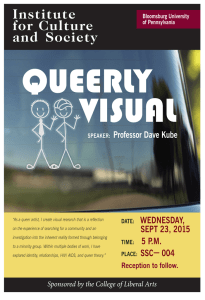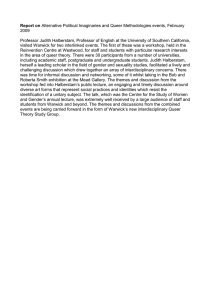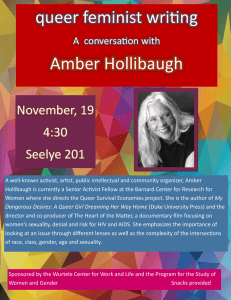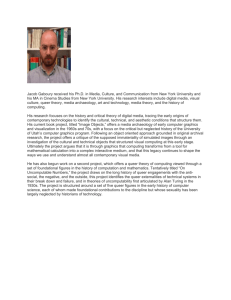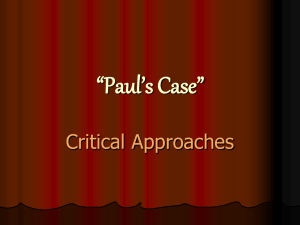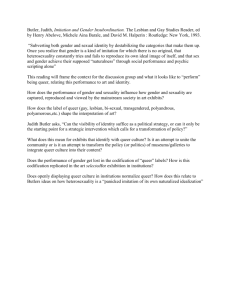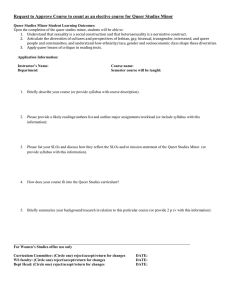‘Queer Asia as Historical Critique’ Conference Report Organizer: Howard Chiang
advertisement
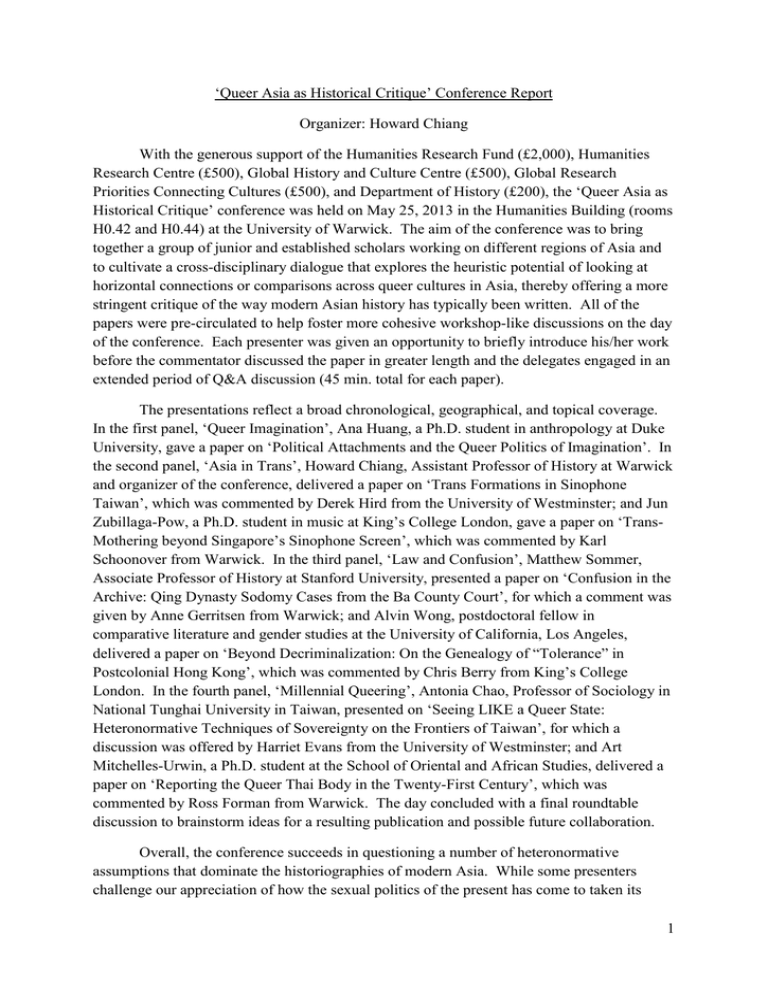
‘Queer Asia as Historical Critique’ Conference Report Organizer: Howard Chiang With the generous support of the Humanities Research Fund (£2,000), Humanities Research Centre (£500), Global History and Culture Centre (£500), Global Research Priorities Connecting Cultures (£500), and Department of History (£200), the ‘Queer Asia as Historical Critique’ conference was held on May 25, 2013 in the Humanities Building (rooms H0.42 and H0.44) at the University of Warwick. The aim of the conference was to bring together a group of junior and established scholars working on different regions of Asia and to cultivate a cross-disciplinary dialogue that explores the heuristic potential of looking at horizontal connections or comparisons across queer cultures in Asia, thereby offering a more stringent critique of the way modern Asian history has typically been written. All of the papers were pre-circulated to help foster more cohesive workshop-like discussions on the day of the conference. Each presenter was given an opportunity to briefly introduce his/her work before the commentator discussed the paper in greater length and the delegates engaged in an extended period of Q&A discussion (45 min. total for each paper). The presentations reflect a broad chronological, geographical, and topical coverage. In the first panel, ‘Queer Imagination’, Ana Huang, a Ph.D. student in anthropology at Duke University, gave a paper on ‘Political Attachments and the Queer Politics of Imagination’. In the second panel, ‘Asia in Trans’, Howard Chiang, Assistant Professor of History at Warwick and organizer of the conference, delivered a paper on ‘Trans Formations in Sinophone Taiwan’, which was commented by Derek Hird from the University of Westminster; and Jun Zubillaga-Pow, a Ph.D. student in music at King’s College London, gave a paper on ‘TransMothering beyond Singapore’s Sinophone Screen’, which was commented by Karl Schoonover from Warwick. In the third panel, ‘Law and Confusion’, Matthew Sommer, Associate Professor of History at Stanford University, presented a paper on ‘Confusion in the Archive: Qing Dynasty Sodomy Cases from the Ba County Court’, for which a comment was given by Anne Gerritsen from Warwick; and Alvin Wong, postdoctoral fellow in comparative literature and gender studies at the University of California, Los Angeles, delivered a paper on ‘Beyond Decriminalization: On the Genealogy of “Tolerance” in Postcolonial Hong Kong’, which was commented by Chris Berry from King’s College London. In the fourth panel, ‘Millennial Queering’, Antonia Chao, Professor of Sociology in National Tunghai University in Taiwan, presented on ‘Seeing LIKE a Queer State: Heteronormative Techniques of Sovereignty on the Frontiers of Taiwan’, for which a discussion was offered by Harriet Evans from the University of Westminster; and Art Mitchelles-Urwin, a Ph.D. student at the School of Oriental and African Studies, delivered a paper on ‘Reporting the Queer Thai Body in the Twenty-First Century’, which was commented by Ross Forman from Warwick. The day concluded with a final roundtable discussion to brainstorm ideas for a resulting publication and possible future collaboration. Overall, the conference succeeds in questioning a number of heteronormative assumptions that dominate the historiographies of modern Asia. While some presenters challenge our appreciation of how the sexual politics of the present has come to taken its 1 current shape, others problematize the historian’s attachment to specific forms of sources as immediate corridors into the past. The dissemination of this research will be in the form of an edited volume. Four of the conference papers (Huang, Chiang, Wong, and Chao) have been invited to be revised for publication in a forthcoming special issue of positions: asia critique on ‘Queer Asia as Historical Critique’. Adding to these four are additional papers by Anjali Arondekar (University of California, Santa Cruz) on colonial India, Robert Phillips (University of Manitoba) on Singapore, Robert Tran (National University of Singapore) on Vietnam, and Dredge Kang (Emory University) on Thailand. Once published, this volume will make an important contribution to queer studies, cultural studies, anthropology, history, and Asian studies. The conference organizer wishes to acknowledge the superb administrative assistance of Amy Evans (Global History and Culture Centre) for making this a successful event. HC September 18, 2013 2
